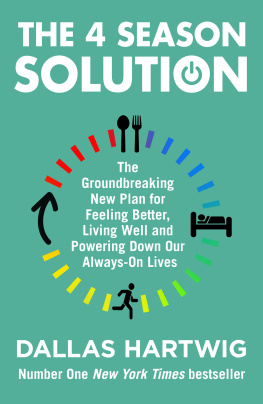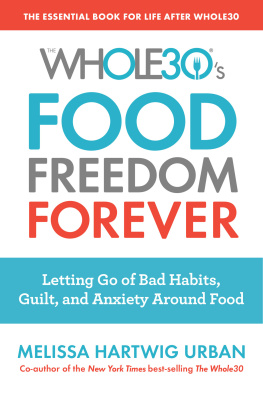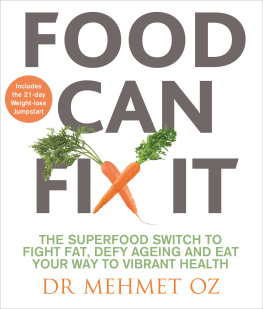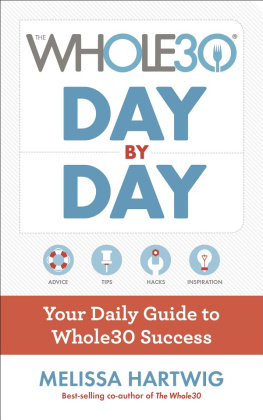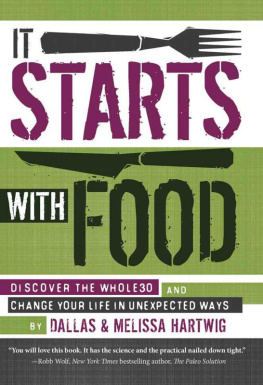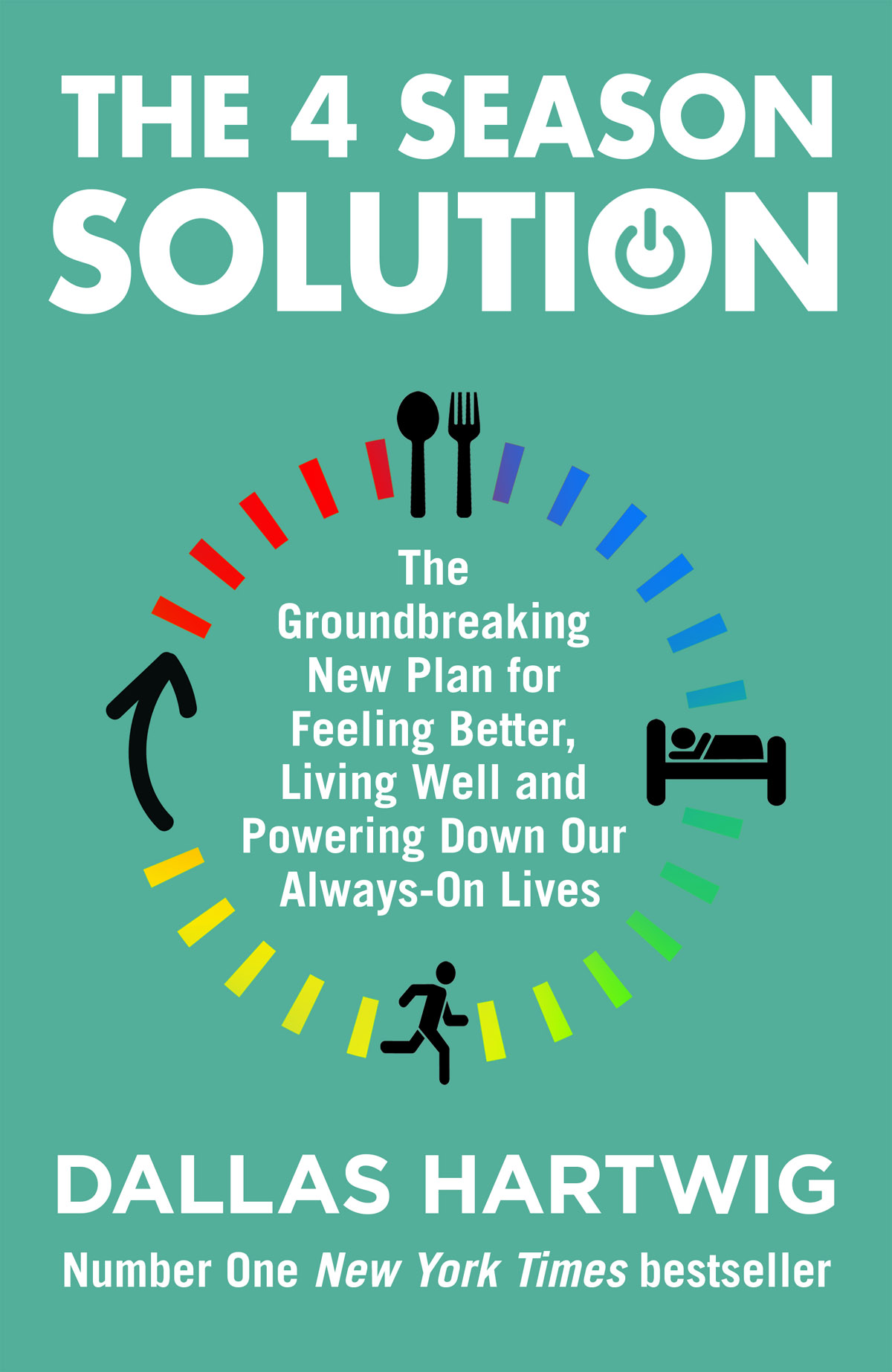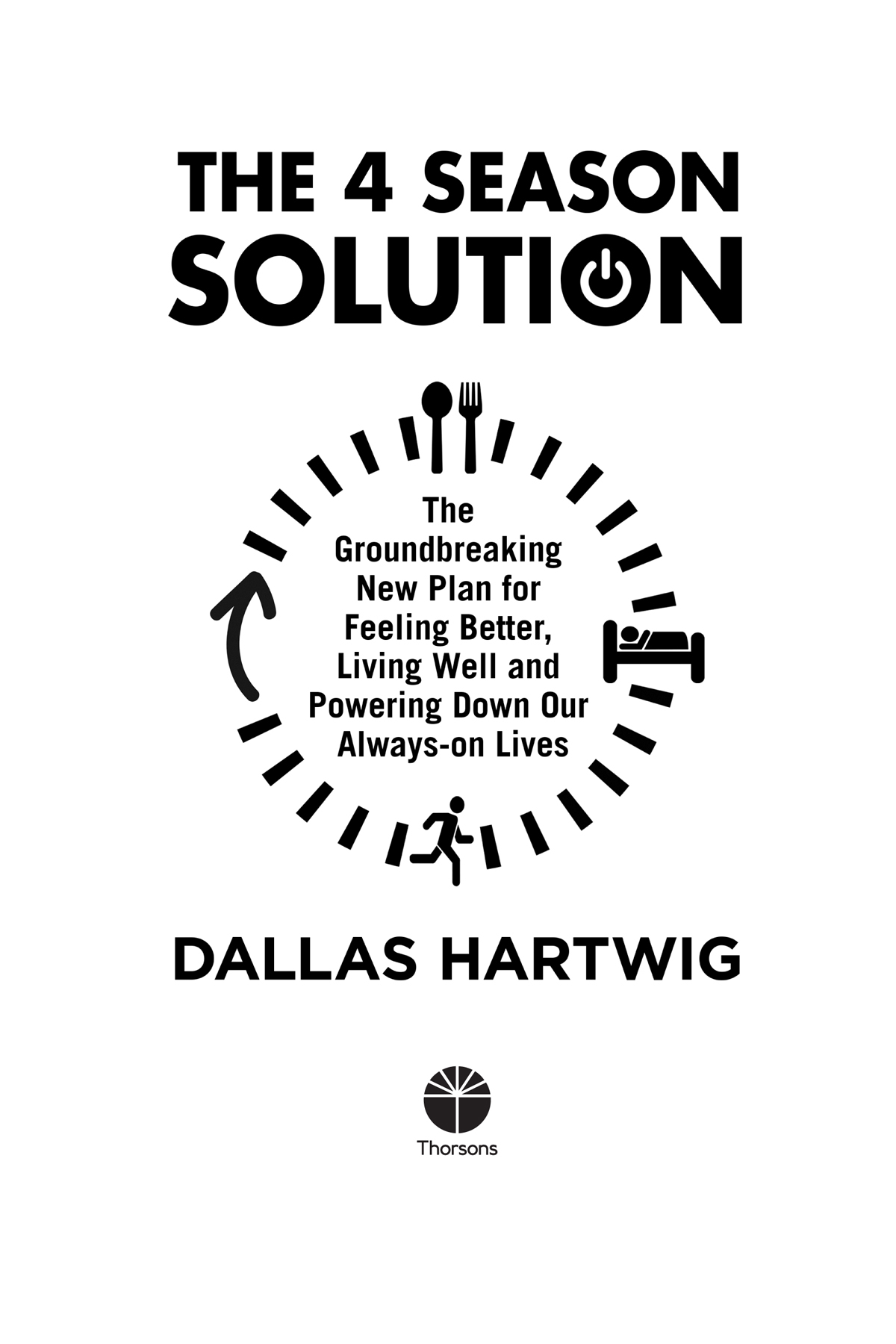CONTENTS
I n 1975, a few years before I was born, my parents bought a very small, century-old log cabin in the rural township of Merrickville in eastern Ontario, Canada. It actually wasnt much of a log cabin. The roof had caved in, and a porcupine was living inside. Still, the land was scenic, mostly wooded, with a few fields that had been cleared by hand about one hundred years earlier. My parents politely asked the porcupine to leave, and for that first summer they lived in the old barn until they could make the cabin habitable again. Then they moved in and made it their home.
As pragmatic, countercultural young adults in the early 1970s, their idea was to live simply, away from the rat race of hectic, urban civilization, and thats exactly what they proceeded to do, continuing this lifestyle even after my sister and I came along. When I say that we lived away from civilization, Im not exaggerating. The cabin was located on one hundred acres at the very end of a dead-end dirt road, many miles from the nearest store or town. Even after it was renovated, it had no electricity or running water. Today, people grumble if theyre without the internet for an hour, but we had to pump our water by hand. Showers? Forget about itwe took baths every so often in a tin washtub.
We heated the house with firewood cut from the property, and our single modern luxury was a propane-powered lantern. Oh, and we had an outhousenot terribly appealing during those frigid Ontario winters. We grew much of our food in a vegetable garden, eating a vegetarian diet and preserving a lot of the food we grew for later months. We had chickens for eggs and goats for milk. A couple of days a week, my mom drove to a town nearby to work at a part-time job. My dad stayed home full time to tend to the house, take care of us kids, keep the garden going, cut wood, and perform other essential tasks. My sister and I spent most of our days outside, exploring the woods, playing with our dog and cat, reading, and daydreaming.
Throughout each day, we lived in sync with the natural rhythms all around us. Because our only light came from oil lamps, the woodstove, and our single, luxurious propane lantern, we organized our schedule according to the suns movement. When the sun rose, we got up. When it set, we wound down and headed to bed. During the winter, this meant that we slept a great deal, since there wasnt much we could do in the dim light of an oil lamp. In general, our life became much quieter and more intimate during the winter months. In the cold, dark winter we appreciated the warmth of the fire, and the close connections with each other. The summer was totally different: it was light outside until nine or ten oclock, so we were much more energetic and physically active, and we slept less.
I had no inkling of it as a child, but in living according to natures rhythms, we were living the way human beings have been doing for most of our history. For most of human history, our ancestors existed as hunters and gatherers, roaming in small bands and living in close contact with their natural surroundings. Like my own family, a band of ancient hunter-gatherers woke with the rising sun, were active and apart during the day, and reconnected in the evening before going to sleep after it got dark. Over the course of the year, they stayed in tune with seasonal variations. Rather, they lived in tune with those variations. There was no other option.
But it wasnt just food and sleep behaviors that followed natural patterns. It was everything. In their diet, their physical movements, and their social interactions, too, our ancestors (and modern-day primitive tribes) stayed in tune with the rhythms of natureeating different foods in different seasons (and in different places), moving their bodies in different ways at different times based on the demands of their environment, and exploring their world freely at times and staying closer to the safety and familiarity of the tribe at other times. The whole arc of their lives followed a pattern that mirrored the seasons of a year: they were born; they budded into adolescence and bloomed into adulthood; they contributed to the tribe through physical labor and sharing wisdom; they shared their lifetime of accumulated wisdom with the rest of the tribe, planting seeds for a better next generation; and eventually they died, often at a very advanced age. Of course, many of our ancestors died prematurely due to infant mortality, accidents, infection, or acts of violenceIm not trying to paint a romanticized picture. But in general, their lives were rhythmic and circular, even leisurely, not because they wished them so, but because thats the way it was for people so immediately dependent on and immersed in nature. Research shows us that contemporary hunter-gatherers actually have considerably more leisure time than we do in our modern, convenience-laden, productivity-oriented society.
My family, of course, didnt have to live so close to nature. And in 1983, when I turned five, we pretty much stopped doing it. We closed up our cabin, sold our land, and moved closer to a small town called Brockville. Although we still lived in a rural setting (on an apple orchard outside of town), we adopted a more conventional way of life. Our new house had electricity and running water, and I attended a small school with other kids from town. By and large, I left behind my intimate connection with nature and those seasonal rhythms. I finished elementary and high school, attended university in the United States, earned a degree in anatomy and physiology and a graduate degree in physical therapy, and lived in a number of places in the country. I was always attentive to healthy livingI ate well (conventionally speaking), played competitive volleyball, climbed mountains, and rode mountain bikes. But I didnt think much about natural living per se, and my own personal habits were as artificial and disconnected from natural rhythms as most peoples.
That began to change in 2007, when my father passed away prematurely of pancreatic cancer. Deeply impacted by his death, I began to look at my life in new ways, and to question many of my lifestyle choices. I was a healthy twentysomething, working in a profession that I enjoyed. I was lean and fit, eating in ways that most people would consider healthy, and blessed with a strong network of friends. Anybody who met me would have considered me the very picture of health. But the reality was more complicated. Deep down, I sensed that not all was right. I was working too hard and obviously not getting enough sleep. I had some adult acne, and chronic inflammation in my left shoulder. I felt stressed and overstimulated, and while I thought I was more or less happy, I also felt adrift, lacking a deeper sense of peace and rootedness. I had lots of friends, but still felt pretty isolated. What was I really doing with my life?
Always intellectually curious, I read a number of books and research papers that cued me in to our evolutionary past and its enormous relevance for our present-day health. I became especially fascinated with the idea of physiological rhythms and began chasing down anything I could find in the scientific literature on that topic. There was quite a lot of research out therehundreds of published papers that I eventually read and analyzed. What I discovered fascinated me.

